The Philosophy of Mozi: A Brief Guide to China's Champion of Universal Love
Feb 28, 2024 · 2 mins read
0
Share

Mozi, a Chinese philosopher who lived around 470-391 BCE, wasn't just a thinker; he was a radical in a silk robe. In an era of Confucian conformity, he dared to advocate for universal love. Ready to learn about the original rebel with a cause?
Save
Share
Unlike Confucius, who emphasized familial bonds, Mozi championed "universal love" (jian ai). He argued for caring for everyone equally, a concept so ahead of its time, it still challenges us today.
Save
Share
Mozi was a man of the people, speaking out against the lavish lifestyles of the ruling class. He saw luxury as a burden on the poor, advocating for a life of simplicity and practicality.
Save
Share
Imagine criticizing war in an age of constant conflict. That was Mozi. He opposed warfare not just on moral grounds but as an economic drain. He believed in protecting states, not conquering them.
Save
Share
A true polymath, Mozi wasn't just about words. He was also an engineer, reputedly inventing devices to defend cities from siege. His ingenuity was as sharp as his philosophy.
Save
Share
Mozi's meritocracy ideas were revolutionary. He believed positions should be based on ability, not birthright, challenging the rigid class structures of his time.
Save
Share
His work, "Mozi," is a collection of writings that cover everything from ethics to government to science. It's a window into the mind of a thinker who wasn't afraid to question the status quo.
Save
Share
Mozi's concept of "Heaven's Will" argued that heaven favored those who were virtuous and just. It was a call to live righteously, with the belief that heaven was watching everything we do.
Save
Share
Despite his significant contributions, Mozi's philosophy was overshadowed by Confucianism and Taoism. Even still, his ideas on universal love and social responsibility resonate more than ever in today's global society.
Save
Share
Bottom line: Mozi was a disruptor ahead of his time, challenging norms and advocating for a fairer society. His life reminds us that questioning the status quo isn't just brave; it's necessary for progress.
Save
Share
0